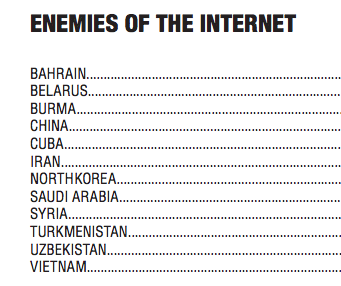Saudi Arabia, an Enemy of the Internet as defined by Reporters Without Borders, is threatening to block a number of popular communication tools, such as Skype and mobile messaging service WhatsApp, unless the operating companies agree to infringe on the privacy of users and monitor them.
According to Brian Whitaker, who blogs at Al-bab, the Saudi authorities:
are threatening to block popular communication services such as Skype, WhatsApp and Viber unless the operating companies agree to monitoring of messages and calls.
Al-Arabiya reports that the Saudi Communications and Information Technology Commission (CITC) has given companies until the end of this week to respond.
If the companies do not comply with the Saudi request, the commission may take action and block these services.
Whitaker adds:
Al-Arabiya reports:
“In case they say it is impossible to monitor the applications, the commission said it will consider procedures to block them altogether in the kingdom.”
The Jeddah-based Arab News says the authorities are concerned because the applications use encrypted connections:
“According to two informed sources who work at local telecommunication companies, this issue has been at the top of the agenda of discussions during meetings between heads of telecom companies and the CITC over the past 20 days. The meetings have finally concluded with the CITC demanding that it be allowed to monitor the encrypted applications.”
Predictably, the authorities justify their demand for monitoring on the grounds that it will help prevent crime and terrorism. But, as Ahram Online points out, conservatives in the kingdom are worried about the growth of internet-based social networks which are outside their control and which “have enlarged the severely restricted scale of freedom of expression”.
Whitaker reminds us:
The question now is whether the companies concerned will agree to the CITC's demands. There was a similar issue three years ago when the CITC threatened to shut down the BlackBerry Messenger service unless it was given access to codes that would allow monitoring of messages.
The matter was later resolved, though it is not clear how. The CITC said it was dropping the ban after Research in Motion, the Canadian company behind BlackBerry, met “part” of its regulatory requirements. Some reports suggested the company had caved in and agreed to put a BlackBerry server in the country so that the Saudis could directly access customer data.
On Riyadh Bureau, Ahmed Al Omran reports that Saudi Arabia's grand mufti Abdulaziz Al Sheikh has described Twitter as a place where youth waste their time and as a “gathering place for every clown and corrupter who post tweets that are illegitimate, false and wrong.”
Al Omran adds:
The Grand Mufti has become increasingly critical of Twitter users recently. In January 2012 he said the social network “has become a platform for trading accusations and for promoting lies used by some just for the sake of fame.” Then in October he called people who use the site “fools” and accused them of lacking modesty and faith.
He also offers statistics on Twitter users in Saudi Arabia, saying:
Twitter has become a major platform for Saudi to exchange ideas and debate political issues in the country. A recent survey said 51% of internet users in Saudi Arabia are active Twitter users, putting it in first place worldwide. A Saudi official admitted last month that the government is struggling to monitor and censor the site due to the huge volume of messages posted by users inside the country.
As Saudis make their voices heard online, thanks to the wide reach of social media, Saudi authorities seem to be working even harder at muzzling their voices.





2 comments
Easy solution if this happens. Search google for ‘vpn trial’. VPN allows you to unblock Viber, Whatsapp and others.
If Saudi Arabia getting any problems with these Skype and WhatsApp, Then this was Block Skype and WhatsApp is fine to evary one.